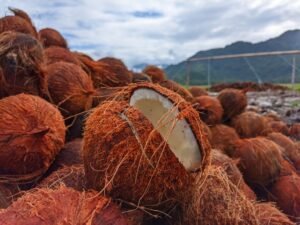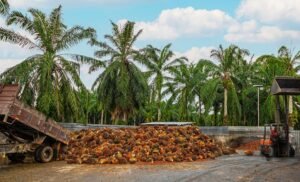
Indian Coconut Export Documents:
What Importers Need to Check

Understanding the Importance of Coconut Export Documents
When it comes to international coconut trade, appropriate coconut export paperwork is the key to shipping without any delays. Indian coconut exporters need to put high-quality documentation for compliance with other countries’ regulations. These documents are necessary for clearing through customs, verifying quality, and legal accountability.
Importers, who may buy the coconuts imported from India, need to verify that these export documents are complete and accurate. For either husked or semi-husked coconuts, any mismatch or lack of paperwork can cause unnecessary detentions or even rejection of the shipment. As the need to import coconuts from India increases, the buyer must be informed about how the documentation guarantees an exported coconut and an easy flow of the supply chain.
Importers, who may buy the coconuts imported from India, need to verify that these export documents are complete and accurate. For either husked or semi-husked coconuts, any mismatch or lack of paperwork can cause unnecessary detentions or even rejection of the shipment. As the need to import coconuts from India increases, the buyer must be informed about how the documentation guarantees an exported coconut and an easy flow of the supply chain.
Mandatory Coconut Export Documents for Importers
To ensure your shipment clears customs and reaches your warehouse without issues, here are the most important export documents you should expect from your Indian supplier:
- Phytosanitary Certificate: Coconuts are categorized into grades based on diameter and weight.
- Certificate of Origin (COO): Establishes that the coconuts are sourced and exported from India and are required by most customs authorities for tariffs or trade benefits.
- FSSAI or Health Certificate: A declaration that the food product meets safety and hygiene standards under India's Food Safety and Standards Authority (FSSAI). It is especially crucial when shipping for edible or cosmetic use.
- Commercial Invoice and Packing List: Includes a detailed breakdown of quantity, price per unit, grading, packaging method, and HS code. The packing list helps customs authorities cross-verify container content.
- Bill of Lading (B/L): A shipping document issued by the carrier. Acts as both a receipt and a contract between the shipper and the transporter. It includes the shipment route, port of loading, port of discharge, and consignee details.
- Export Declaration & Inspection Reports: Required to clear Indian customs and confirm export permission has been granted.
Compliance and Registration Requirements for Exporters
For instance, to do business internationally, Indian coconut exporters are required to have certain licenses and registrations. Importers need to check these things ahead of time before obtaining bulk shipments, as they might become a problem further down the line. For instance, any Indian firm that ships goods outside India requires a valid Import Export Code (IEC). The code is allotted to individual exporters by the Director General of Foreign Trade (DGFT).
Secondly, coconut exporters must be registered with the Agricultural and Processed Food Products Export Development Authority, APEDA. APEDA facilitates training for exporters regarding quality standards, traceability, and documentation. If you are in the EU or the USA, and your buyers would like more guaranteed reassurances, suppliers can be sought that are organically or fairly traded certified. These steps in compliance show that the supplier is working at a regulated level and can provide consistent documentation with orders.
Secondly, coconut exporters must be registered with the Agricultural and Processed Food Products Export Development Authority, APEDA. APEDA facilitates training for exporters regarding quality standards, traceability, and documentation. If you are in the EU or the USA, and your buyers would like more guaranteed reassurances, suppliers can be sought that are organically or fairly traded certified. These steps in compliance show that the supplier is working at a regulated level and can provide consistent documentation with orders.
Country-Specific Document Preferences
While most documentation follows international norms, some countries have specific requirements when importing coconuts.
- Middle East (UAE, Oman, Saudi Arabia): May request a Halal Certificate for coconuts used in food products. Moisture testing reports are also common.
- Europe (Germany, France, UK): Strict traceability and health certification are often mandatory. Organic coconuts must be accompanied by EU-recognized certification and barcoding.
- Southeast Asia (Singapore, Malaysia): Need regionally compatible labeling and fumigation clearance if the coconuts are stored in transit zones with pest-control rules.
Understanding these nuances helps importers coordinate with their Indian suppliers and prepare customs entries in advance. Coconut shipment papers must be tailored to each country’s legal expectations.
Common Mistakes Importers Should Avoid
In the case of coconut export paperwork, a small mistake could mean significant delays in a shipment. Incomplete or inconsistent paperwork causes problems for many new buyers. One common error is that the inspection dates are old on the phytosanitary certificate. As coconuts are perishable, the windows of validity are short. Another frequent error is a packing list that doesn’t match the invoice or bill of lading.
Some importers fail to pay attention to documentation regarding pre-shipment inspection, which is compulsory in countries such as the UK or Singapore. If this is neglected, the shipment can be held in customs, and demurrage charges will apply. To prevent the above, importers should request all documents before the shipment leaves, and verify that everything is consistent within fields such as HS codes, net weight, consignment, etc.
Some importers fail to pay attention to documentation regarding pre-shipment inspection, which is compulsory in countries such as the UK or Singapore. If this is neglected, the shipment can be held in customs, and demurrage charges will apply. To prevent the above, importers should request all documents before the shipment leaves, and verify that everything is consistent within fields such as HS codes, net weight, consignment, etc.
Working with Document-Ready Exporters
To streamline the coconut buying process, it’s smart to work with exporters who are already experienced in international compliance and document preparation. Leading coconut exporters in India often provide documentation for coconut exports as part of their service offerings.
These exporters usually maintain templates for each import country and update them according to regulation changes. They often conduct mock customs inspections, verify packaging standards, and maintain digital archives of export files. Some even offer online dashboards where importers can download their coconut export documents, bills, and certificates in real-time.
Buyers should prioritize vendors with a proven history of managing customs clearance processes without delays, especially for bulk shipments.
These exporters usually maintain templates for each import country and update them according to regulation changes. They often conduct mock customs inspections, verify packaging standards, and maintain digital archives of export files. Some even offer online dashboards where importers can download their coconut export documents, bills, and certificates in real-time.
Buyers should prioritize vendors with a proven history of managing customs clearance processes without delays, especially for bulk shipments.
Well-Documented Shipments Build Trade Confidence
In an otherwise global coconut trade, documentation is a sign of professionalism and organization. International buyers also find it easier to clear customs because of the clean, complete, and on-time documentation that Indian exporters have developed a good reputation for.
With importers dealing with huge contracts and international border procedures, knowing and trusting each coconut export document guarantees confidence in every shipment. Documents like phytosanitary certificates and APEDA registration are not just paperwork, but critical for future success in global trades.
With importers dealing with huge contracts and international border procedures, knowing and trusting each coconut export document guarantees confidence in every shipment. Documents like phytosanitary certificates and APEDA registration are not just paperwork, but critical for future success in global trades.
Lorem ipsum dolor sit amet consectetur.
Lorem ipsum dolor sit amet consectetur. Consequat vulputate convallis eget mollis viverra nunc mi egestas. Risus facilisi nullam donec.


